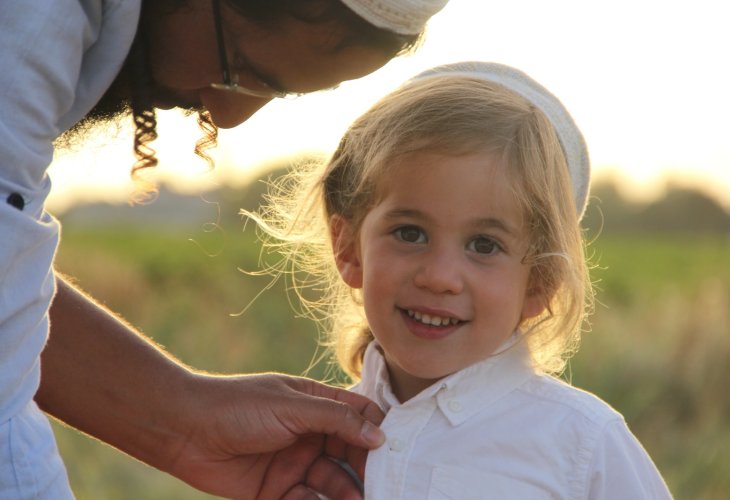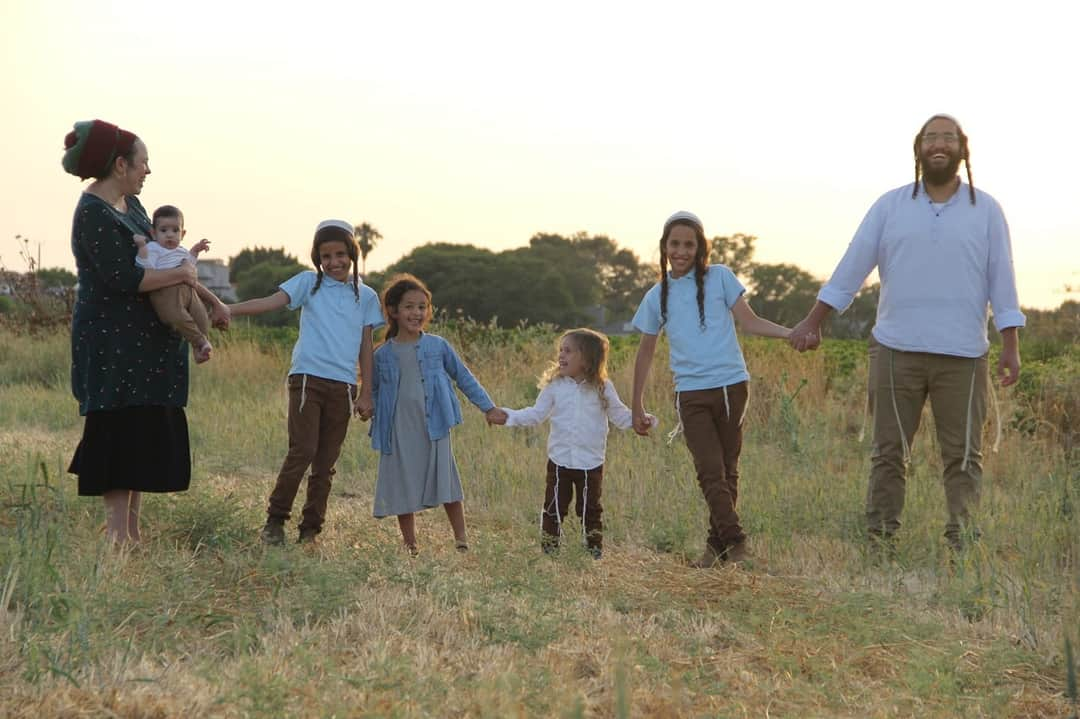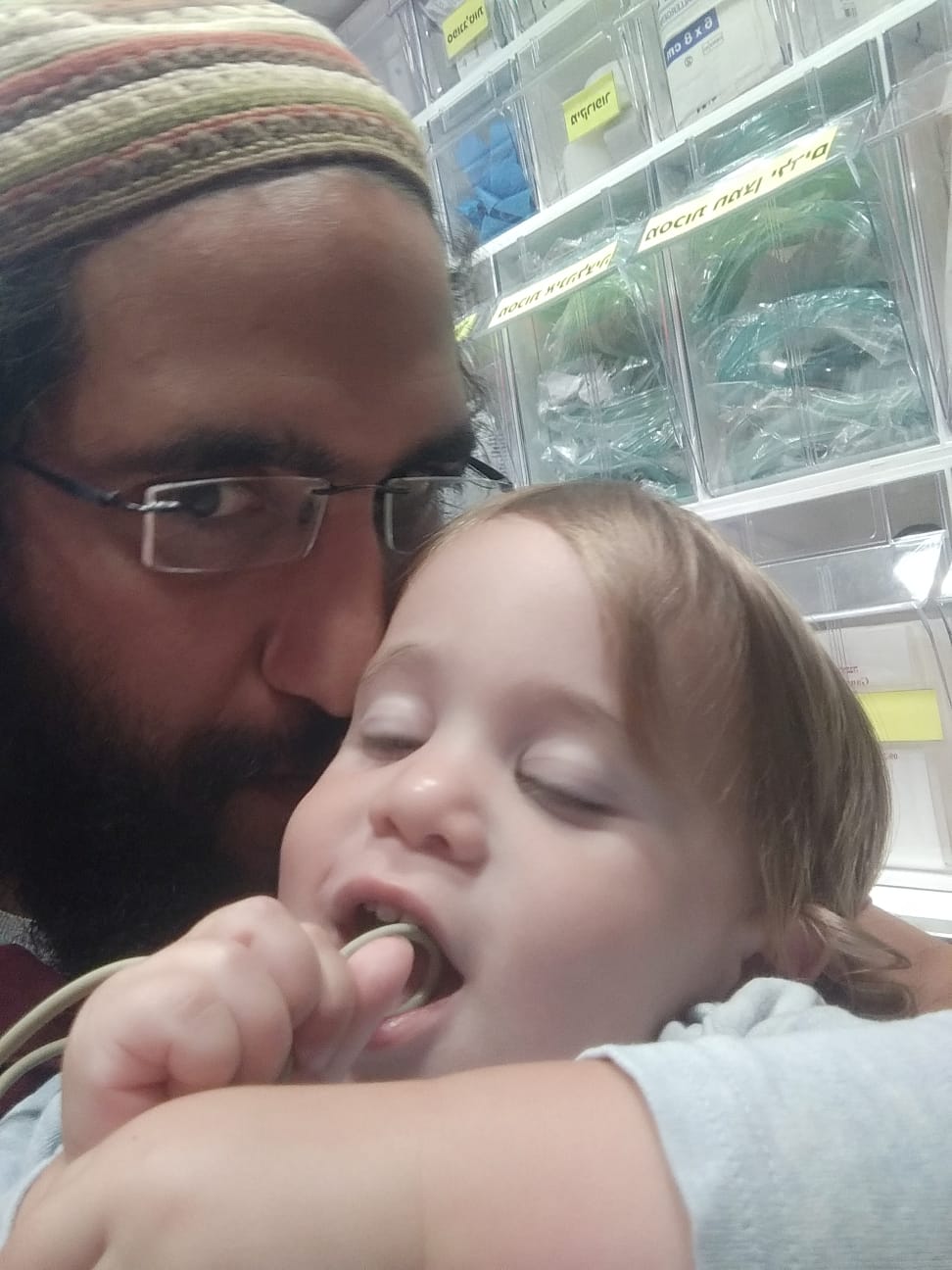The Parents of a Toddler Forgotten in a Car: "The Children Asked Me If He's Alive". A Heart-Wrenching Interview
Two years ago, on one of the hottest summer days, Efrat and Orain Sharabi discovered that their one-year-old child was left alone in their scorching car for a prolonged period. Now, with the start of the 'intermediate days' holiday and the peak of summer, they share their personal story to help prevent such horrific incidents in the future.
 Tohar Yosef Sharabi (Photo: Merav Verner)
Tohar Yosef Sharabi (Photo: Merav Verner)Late afternoon, twilight, and the view from the window of the Sharabi family's home in Harsha offers one of the most beautiful panoramic sights in the country. "If you look left," says Orain, the father of the family, "you can see Ashdod's beaches. A glance to the right will reveal Hadera. And you came on a day when the visibility isn't at its best."
A few meters from us, Tohar Yosef (3), the fourth child of Orain and Efrat, plays with his siblings and friends. Orain and Efrat, both 30, are parents to five children. Orain works in music productions, tourism, and events, while Efrat works as a secretary at a nearby yeshiva. Recently, like many others, their livelihood has been significantly affected by the COVID-19 pandemic.
Seeing Tohar playing with his family is not to be taken for granted and brings special joy. Two years ago, on one of the hottest summer days, Tohar was left alone for a long time in his parents' scorching car, and thanks to a series of open miracles, his life was saved at the last moment. To increase awareness on this issue and to save more lives literally, the Sharabi couple agreed to be interviewed openly and share their personal story, where fear, joy, and pain intertwine.
 Sharabi Family (Photo: Merav Verner)
Sharabi Family (Photo: Merav Verner)
It Won't Happen to Me
"Three years ago, in the summer," Orain says, "we couldn't arrange a vacation, so the next year we took a special holiday. We rented an excellent cabin in the north from Monday to Thursday, and a few hours before returning home, we heard that my wife's family was coming to visit in Yesod HaMa'ala, at friends' place, so we decided to rent a nearby apartment and join them. On Friday morning, we traveled to Safed and from there continued to Yesod HaMa'ala. We stopped at a farmers market on the way, bought fruits, and I went to my father-in-law's apartment so he could tithe them because he understands more than me about the laws of tithing. When we arrived, one of my sisters-in-law took Tohar, who was then a year old, and played with him.
"We needed to organize a few things in the apartment we rented," continues Efrat, "so we left him with my parents and went back to the apartment. About an hour later, we returned to the parking lot of the apartment where my parents were, my brother suddenly arrived to visit and surprised us, and in this melee, before we went back to our place, my sister put Tohar in our car, in the back seat, without us noticing. Before the trip, we had covered the back seat window with a piece of cloth to protect Tohar from the sun. That's why we didn't see him after my sister returned him to the back seat.
"We returned to our apartment, and while preparing for Shabbat, I told Orain: 'How nice that Tohar is at my parents' and we can organize peacefully.' If only I had known then that he was locked alone in the car, G-d forbid. What a frightening thought. I told Orain several times to bring the urn from the car, but he kept delaying. Shabbat was approaching, and I asked him to hurry, so he went out to the car to get the urn.
"I leave the apartment heading for the car, and the urn was in the trunk," Orain says in a trembling voice, "and somehow I look towards the driver's seat. Hashem just directed my head towards the driver's seat, and suddenly I see Tohar unconscious on the seat. From that moment, everything happened so fast. Fractions of seconds. I leap towards him, and meanwhile, I wonder if what is happening is real. I don't understand how it happened.
"I ask myself what he's doing here; he's supposed to be with Efrat's parents. Unfortunately, I had heard of cases of children being forgotten in cars before, and every time I didn't understand how that happens to people. I had real criticism of the parents it happened to. I asked them more than once, internally: 'How do you do such a thing? How can you forget a child? You've never forgotten your phone, and yet you forgot the child?!'.
"I remember all this at these moments, and realize that this time it has come to me. I told myself all these years: 'It won't happen to me,' but it did, in a big way. I approach him quickly, look through the window, and I saw in my eyes a dead child. Burnt. I'm half Yemeni but Tohar came out fair-skinned, and I see how his cheeks are red. Burned. He was in the back seat, but somehow ended up in the driver's seat. And this, by the way, is one of the great miracles that happened here. If he had stayed in the back seat, I wouldn't have seen him because of the cloth I mentioned earlier, the cloth we put to protect him from the heat.
"Tohar reached the driver's seat because apparently, he tried to get out of the car. I opened the door, lifted him, and saw he was powerless. Unconscious. When I picked him up, he opened his eyes a bit, probably because he finally got some air. I saw him rolling his eyes and thought he had a brain injury. In such heat, combined with a lack of oxygen, brain cells can burn".
Suddenly I Burst into Tears
"I took Tohar out of the car, raised my face, and saw Efrat facing me. As I saw Tohar in the car, I started screaming, Efrat heard me and ran outside. I look at her and see her face just froze in front of me. As if she was frozen. Thank G-d, I acted as needed and immediately ran with him to the bathroom. I'm not a big hero, but a few months before this happened, I was at a thanksgiving meal held for a miracle that happened to a girl we know, and her father said that at the time he treated her as if she was a child he didn't know. Zero emotion. Only brain.
"I knew the most important thing now was to cool him, so I ran with him to the bathroom and poured cold water on him. I'm holding him, trying to wake him, but seeing his head fall again and again. I realize the situation is not good. All the way from the car to the bathroom, I'm yelling: 'G-d, G-d, save him.' I have never prayed like that from the heart. Not before and not after.
"Those were the hardest moments of our lives," says Efrat. "We stand aside and don't know what to do. The children asked me if he was alive, and I told them I didn't know. I wanted to call the EMT, but in the panic, I didn't remember the number. I called my father, and he rushed toward us and meanwhile called in rescue forces. There's something called the 'Forgotten Children in a Car Protocol.' When such a thing happens, they sometimes send a helicopter, and in our case, they sent one. Police also arrived within a short time. In such cases, they also investigate the parents, and it's not easy at all. Eventually, we were indeed investigated at the Rosh Pina station on the first Sunday following the whole story.

"It took Tohar about two minutes to wake up from the faint," Orain says, "and it was insane joy when we saw him coming back to himself. Within a few minutes, a volunteer from the EMT arrived, checked him out, said everything was okay, and canceled the helicopter. At that moment, when I realized, thank G-d, he would live, I burst into uncontrollable tears. It was an outpour of emotions that, in certain ways, hasn't ended yet. I'm sure I'm suffering from post-trauma. Even today, when I drop him off at kindergarten in the morning, I hug him, say goodbye, and then go to work. When I return to the hot car at the end of the day, my whole body is in stress. Memories arise from that Friday that changed our lives.
"Anyway, things calmed down a bit, Tohar returned to himself more and more, and half an hour before Shabbat, he and I left in the ambulance towards the hospital in Safed. The only times in my life that I traveled on Shabbat were when he was born and in this case. Both times these were in an ambulance. At the hospital, they did tests, gave him fluids, and the situation, thank G-d, continued to improve. The doctors said we had experienced several huge miracles here. For example, if it had happened at hotter hours of the day, say two hours earlier, or if he had stayed there a few more minutes, Tohar wouldn't have survived it.
"On the way to the hospital, I asked my rabbi if I could return on Shabbat morning with the non-Jewish driver who drives the nurses, and he permitted me. I knew Tohar needed his mom, and his mom needed him. The driver understood the situation and drove me to the apartment we rented. I took his business card and called him after Shabbat to thank him. He was so sensitive to the situation, and I was truly grateful. I returned with Tohar to the family, and the emotions overwhelmed all of us. It's something we will never forget".
Charity Saves from Death
"What Orain told is the main story, but some interesting things also happened around the incident. On that Friday, when we were in Safed, I went to buy a dress for Shabbat, and at the entrance to the store stood a man handing out booklets about the righteous man from Yavnal and was waiting for charity. Orain usually doesn’t give charity to people he doesn’t know, but that day I asked him to give. He opened his wallet, gave coins to our three older children, and didn’t naturally give any to Tohar, who was then a year old.
"That guy gave Orain a booklet, and Orain took it and put it in his pocket. When we got to the apartment, Orain put the booklet somewhere, and we forgot about it. The next morning, I pick up the booklet we received, see that its title is ‘Complete Healing,’ and just can’t believe it. The whole booklet talks about people who come to hospitals and is full of encouragements for such hard times. The rabbi writes there that if a person came to the hospital, then apparently he has something to correct there, to trust in G-d, speaks about 'charity saves from death,' etc. We were just in shock.
"Two weeks after the incident," Efrat continues, "we held a huge thanksgiving meal at our house. During that period, we were careful about every shekel we spent, but we didn’t spare any expense on the thanksgiving meal. Over 150 people came, and we spent over 7,000 shekels. The event was very moving. We felt such a huge need to thank the Creator of the World, and we did it openly.
"Since what happened to us, I want to tell everyone who drives children – don't say 'It won't happen to me.' It can happen to the most responsible people in the world. Do everything you can to make sure you haven't forgotten any child in the car. I wouldn't wish anyone to experience what we went through. It's about human lives, sometimes those we love the most in the world."

